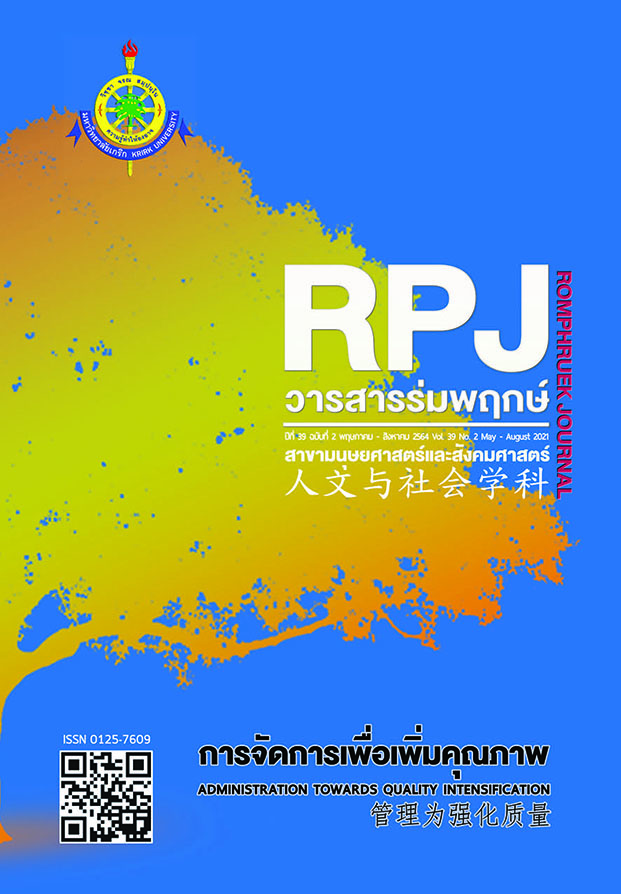Enhancing Operational Efficiency of The Quality Accounting Firm to The Digital Quality Accounting Firm
Main Article Content
Abstract
The revolution of Thai economic structure towards digital economy has accelerated the operational efficacy of an accounting firm to digitize its accounting services. According to the International Education Standards for Professional Accountants, three components are covered as basic concepts and conceptual framework for financial reporting . Part 1: the quality of accounting information consists of (1) accuracy and completeness, (2) timeliness and (3) concerning decision-making. Part 2: quality of accounting information system consists of its (1) integration (2) flexibility and (3) stability. Part 3, the digital accountant competencies consists of (1) knowledge of professional accounting (2) knowledge of information technology (3) skills in applying information technology tools (4) ability in financial data analysis (5) communication skills relating to finance and accounting information (6) knowledge and skills in business and (7) professional ethics.
Article Details
Every article published in the Romphruek Journal of the Humanities and Social Sciences is the opinion and point of view of the authors. Thery're not the viewpoint of Krirk University or the editored department. Any part or all of the articles for pablication must be clearly cited.
References
กรมพัฒนาธุรกิจการค้า กระทรวงพาณิชย์. (2563). การรับรองสำนักงานบัญชีคุณภาพ. (23 เมษายน 2563) สืบค้นจาก https://dbd.go.th/news_view.php?nid.
ฐปนพรรษ์ นุทกาญจนกุล. (2560). ผลกระทบและการเตรียมความพร้อมของนักบัญชีไทยต่อปัญญาประดิษฐ์. คณะพาณิชยศาสตร์และการบัญชี มหาวิทยาลัยธรรมศาสตร์, กรุงเทพฯ.
บรรจงจิตต์ อังศุสิงห์. (2563). กรมพัฒนาธุรกิจการค้า เร่งยกระดับสำนักงานบัญชีคุณภาพ162 แห่ง เป็นสำนักงานบัญชีดิจิทัล. (7 มกราคม 2563) สืบค้นจาก http://www.matichon.co.th/news-onitor/news _1870580.
พัชรินทร์ ใจเย็น กฤษฎา มณีชัย ธัญลักษณ์ ครึ่งธิ และ ณัฐวัชต์ บุญภาพ. (2560). นักบัญชีกับเทคโนโลยียุคปัจจุบัน. Journal of Pacific Institute of Management Science, 3(1), 196-207.
วัทธยา พรพิพัฒน์กุล. (2561). CGMA, “Building a better business, together : Welcome to finance business partnering, 2018. Raef Lawson, “Management Accounting Competencies : Fit for Purpose in a Digital Age?”. (4 ตุลาคม 2561) สืบค้นจาก https://bangkok-audit.com.
ศุกร์ศศิพรรณ วงศ์ประเทศ. (2561). ความพร้อมของการใช้ปัญญาประดิษฐ์ของสำนักงานบัญชีในการปฎิบัติงานของนักบัญชีในเขตกรุงเทพมหานคร. (23 เมษายน 2564) สืบค้นจาก http://www.ba-abstract.ru.ac.th.
สภาวิชาชีพบัญชีในพระบรมราชูปถัมภ์. (2561). มองปัญญาประดิษฐ์ (ArtificialIntelligence : AI) ให้เป็นโอกาส. (22 เมษายน 2564) สืบค้นจาก https://www.tfac.or.th/upload/9414/PqonmO5Epr.pdf.
สภาวิชาชีพบัญชีในพระบรมราชูปถัมภ์. (2562). กรอบแนวคิดสำหรับการรายงานทางการเงิน. (5 ธันวาคม 2563) สืบค้นจาก https://www.tfac.or.th/Article/Detail/94713.
สภาวิชาชีพบัญชีในพระบรมราชูปถัมภ์. (2562). มาตรฐานการศึกษาระหว่างประเทศสําหรับผู้ประกอบวิชาชีพบัญชี. (2 พฤศจิกายน 2563) สืบค้นจาก http://www.fap.or.th/ มาตรฐานวิชาชีพบัญชี/มาตรฐานการศึกษาและเทคโนโลยี.html.
สุชาดา กรวิทยาศิลปะ. (2559). นักบัญชีกับประเทศไทย 4.0. (2 ธันวาคม 2563) สืบค้นจาก http://www.fap.or.th/images/column_1477650726/Thailand%204_0.pdf.
สุวิทย์ เมษินทรีย์. (อ้างใน Borworn.). (2560). ประเทศไทย 4.0 อะไร ทําไมและอย่างไร. (20 ตุลาคม 2563) สืบค้นจาก http://www.drborworn.com/articledetail.asp?id=16223.
โสรดา เลิศอาภาจิตร์. (2563). กรมพัฒน์พัฒนาธุรกิจการค้าพลิกโฉมสํานักงานบัญฃีไทยสู่ Digital Accounting Firm. (10 กรกฎาคม 2563) สืบค้นจาก : http://www.dbd.go.th/ewt_news.php?nid= 469404627&filename=index.
อุเทน เลานำทา และ นิภาพร อบทอง. (2560). ความสามารถของระบบบัญชีคอมพิวเตอร์กับความได้เปรียบด้านข้อมูลทางการบัญชี ของธุรกิจชิ้นส่วนอิเล็กทรอนิกส์ในประเทศไทย. WMS Journal of Management Walailak University, 6(3), 20.
Astrachan. (2010). Strategy in family business : Toward a multidimensional research agenda. Journal of Family Business Strategy, 1(1), 6 – 14.
DeLone, W. H. & McLean, E. R. (2003). The DeLone and McLean Model of Information Systems Success : A Ten-Year Update. Journal of Management Information Systems, 19(4), 9-30.
Seung Hwan Kang & Jira Yammeesri. (2013). Impact of accounting information systems and internal control. UTCC International Journal of Business and Economics (UTCC IJBE), 9(1), 7-9.


